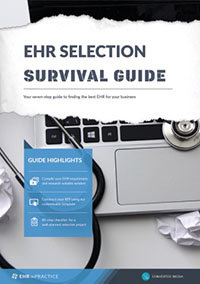3 tips for comparing the prices of EHR systems
The Internet is far from bereft of comparison-shopping tools. EHRs fall into this trend as well, with a reasonable share of comparison-based resources that provide consumers the opportunity to compare functionality and price. Comparing functionality is quite a simple proposition-it is either present or not. Comparison of pricing becomes a bit more complicated, as the price listed often represents the quoted price as opposed to the actual cost of owning and implementing the software over the short and long term.
Here are three tips to keep in mind when it comes to start comparing EHR prices:
1. Consider long-term costs of ownership
As part of the selection process, one should pay particular attention to the long-term costs associated with an EHR. Using this strategy raises the obvious question as to why long-term costs associated with an EHR need to be modeled? One primary reason rests on the fact that switching EHRs is costly. Thus, a practice should take the long term into account and not assume that their current EHR will be a temporary fix until something better can be found in the future. With this framework in mind, long-term ownership costs for electronic health record platforms are often expressed in a 5 or 7 year forecast, with some even considering 10 year forecasts. The main take away is to consider the long view when thinking of EHR prices and costs.
Recommended Reading: EHR Pricing Guide - Compare EHR prices side by side in our guide
2. Does the contract reflect all costs?
The costs of implementing an EHR from the practice side are well documented by the experiences of EHR customers, and can be significant, ranging from $15,000 to $70,000 per provider. Consumers often fail to read the fine print, or do not ask enough questions (or the right questions) of their vendors regarding any costs that are not included in the quoted price. To the chagrin of many consumers, many contracts do not provide a single, bottom-line EHR price, instead opting for numerous specific fees that are contingent on the consumer obtaining specific products and services. Also, some EHR contracts do not clearly define the products and services the vendor will provide, raising the possibility that the vendor will later charge you unanticipated additional fees for services. To avoid confusion in EHR comparison pricing be certain that the vendor provides you with a contract that clearly list the fees the practice will have to pay given the intended use of the EHR platform.
3. Total out of pocket costs
A last and equally important consideration in an EHR pricing comparison involves the total cost of ownership (TCO). According to the U.S. Department of Health and Human Services, the TCO is determined by “calculating the initial purchase price and long-term costs of the EHR system.” This calculation includes direct costs such as purchase price, any additional software and hardware and setup costs. The TCO should also address indirect costs in the acquisition phase, during the implementation, and after implementation. The TCO provides a full view of total costs to a practice, by presenting what can best describe as a worst case scenario for costs. If a vendor is unwilling or unable to provide the necessary figures to make a TCO calculation it may be wise to select one that can offer more transparent pricing.
Just as in any other purchasing decision, comparison pricing is only effective if all the pricing information is transparent thereby allowing a consumer to make an informed choice as to cost. Without all of the required information a consumer is effectively flying blind into a transaction which can lead to difficulty in the future arising from unexpected costs.
Free white paper

EHR Pricing Guide
Get your complete guide to EHR software pricing and project costs. Your headstart on EHR pricing research

Featured white papers
Related articles
-

5 key stakeholders in your EHR selection
Learn about the individuals that, when consulted early and often, can make your EHR selection pro...
-

5 important areas of EHR training during implementation
Successful EHR implementation is not possible without crucial EHR training
-

Top oncology EHRs to kickstart your selection shortlist
Learn about some of the leading oncology EHR systems on the market including CureMD, ARIA Oncolog...



